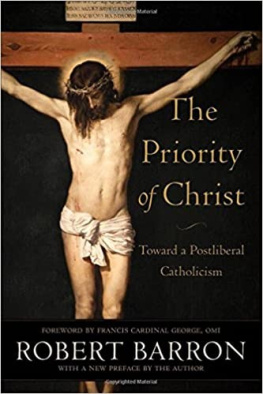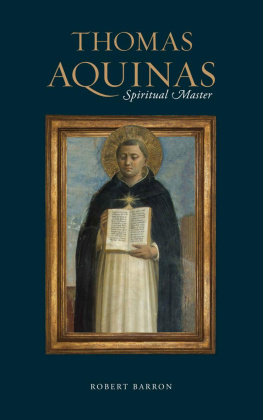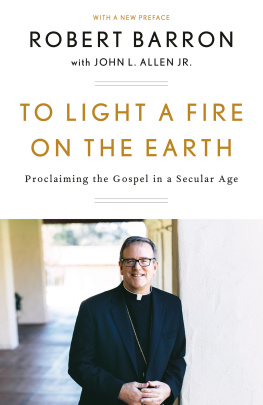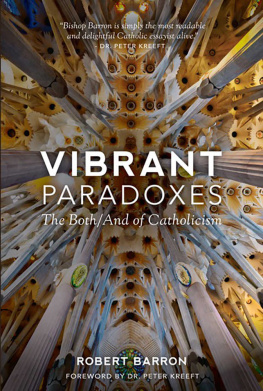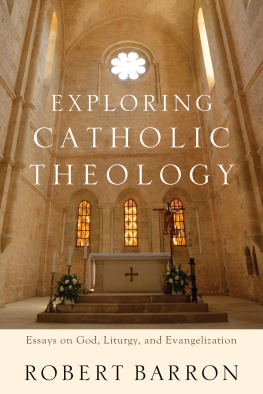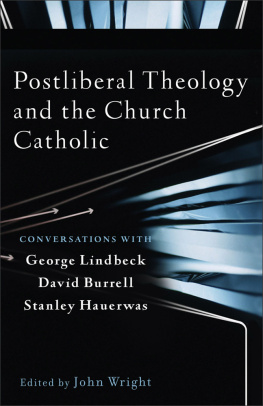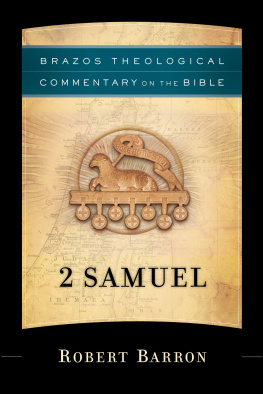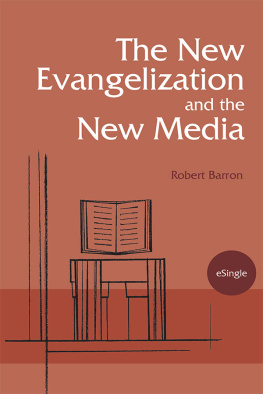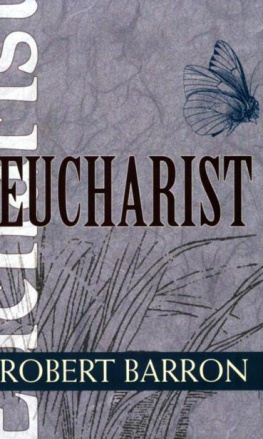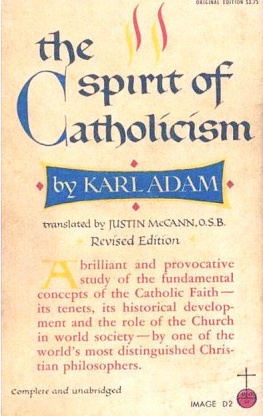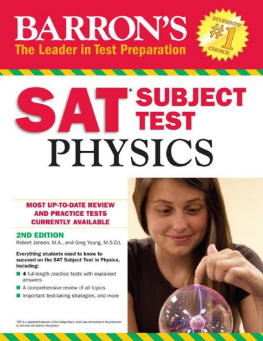Robert Barron - The Priority of Christ: Toward a Postliberal Catholicism
Here you can read online Robert Barron - The Priority of Christ: Toward a Postliberal Catholicism full text of the book (entire story) in english for free. Download pdf and epub, get meaning, cover and reviews about this ebook. year: 2016, publisher: Baker Academic, genre: Religion. Description of the work, (preface) as well as reviews are available. Best literature library LitArk.com created for fans of good reading and offers a wide selection of genres:
Romance novel
Science fiction
Adventure
Detective
Science
History
Home and family
Prose
Art
Politics
Computer
Non-fiction
Religion
Business
Children
Humor
Choose a favorite category and find really read worthwhile books. Enjoy immersion in the world of imagination, feel the emotions of the characters or learn something new for yourself, make an fascinating discovery.
- Book:The Priority of Christ: Toward a Postliberal Catholicism
- Author:
- Publisher:Baker Academic
- Genre:
- Year:2016
- Rating:5 / 5
- Favourites:Add to favourites
- Your mark:
- 100
- 1
- 2
- 3
- 4
- 5
The Priority of Christ: Toward a Postliberal Catholicism: summary, description and annotation
We offer to read an annotation, description, summary or preface (depends on what the author of the book "The Priority of Christ: Toward a Postliberal Catholicism" wrote himself). If you haven't found the necessary information about the book — write in the comments, we will try to find it.
The Priority of Christ: Toward a Postliberal Catholicism — read online for free the complete book (whole text) full work
Below is the text of the book, divided by pages. System saving the place of the last page read, allows you to conveniently read the book "The Priority of Christ: Toward a Postliberal Catholicism" online for free, without having to search again every time where you left off. Put a bookmark, and you can go to the page where you finished reading at any time.
Font size:
Interval:
Bookmark:
2007 by Robert Barron
Published by Baker Academic
a division of Baker Publishing Group
P.O. Box 6287, Grand Rapids, MI 49516-6287
www.bakeracademic.com
Hardcover edition with new preface published in 2016
Ebook edition created 2016
All rights reserved. No part of this publication may be reproduced, stored in a retrieval system, or transmitted in any form or by any meansfor example, electronic, photocopy, recordingwithout the prior written permission of the publisher. The only exception is brief quotations in printed reviews.
Library of Congress Cataloging-in-Publication Data
ISBN 978-1-4934-0589-3
Unless otherwise indicated, Scripture quotations are from the New Revised Standard Version of the Bible, copyright 1989, by the Division of Christian Education of the National Council of the Churches of Christ in the United States of America. Used by permission. All rights reserved.
Contents
Foreword
F aith and reason, wrote Pope John Paul II, are the two wings the human spirit uses to reach truth. The dialogue between faith and reason is a constant in human conversation, with faith using reason to understand more adequately faiths own truths, and reason using faith to understand better reasons own nature and that of its findings.
This centuries-old conversation, characterized in Patristic literature as a dialogue between Jerusalem and Athens, finds new expression in Fr. Robert Barrons highly significant work. The dialogue takes on new importance today because some believers reject any rational critique of their faith, and some rationalists imagine the possibility of a purely secular reason. The danger in such positions is that faith without critique has too often legitimated violence, and reason divorced from faith has constructed utopian or scientific experiments that kill the human spirit along with millions of human beings.
Father Barrons work is theological, for his own reflection is shaped by the task the Church has given him to teach theology at Mundelein Seminary in the Archdiocese of Chicago. He situates the dialogue between faith and reason in the conversation between those who begin theologizing with the data of revelation, shaping human experience by its demands, and those who begin theologizing from a philosophical or anthropological base, fitting revelation into the contours of reason and human experience.
The Priority of Christ puts this ancient and contemporary dialogue to new music. Fr. Barron creates a postliberal theology that is neither a return to Scholasticism nor even to the Fathers, although he draws upon the resources of earlier theologians. His is a theology that reaches back for its sources and forward for its concerns. Precisely to move forward, Fr. Barron must disempower modernitys critique of faith and modify the exaggerated claims advanced by historicity. The priority of Christ is ontological, epistemic and ethical; but the new melodies chanting who Christ is cant be heard without first muting the tired songs derived from Cartesian subjectivism. The original sin of liberal Christianity is to reduce divine self-revelation to personal religious experience.
When I was a seminarian over four decades ago, an experienced spiritual director used to take my many concerns about the spiritual life and the life of faith and bring them to the light of Christ. He suggested to me a practice Ive maintained over these many years. Each year, he advised, I should not just read theology or philosophy, but take and make my own at least one book on the life of Christ. He was concerned neither with the quest for the historical Jesus nor with having me answer naively what Jesus might do with my questions. He was insistent only that constantly living with the Lord creates a curiosity about him that cannot be satisfied by purely intellectual investigations. Jesus is not an idea but a person. In encountering him and surrendering to him, faith is born and reason challenged creatively.
This book gives analogous advice and insight to theologians today. Fr. Barron presents Jesus as an icon, beyond concept but not beyond rationality, a super-saturated phenomenon that is the central character in narratives that are always unique and never generic. Idols are manipulative expressions of our making; icons, by contrast, destroy special interests because they draw us into their world and prevent ours from becoming absolute. God is like a noisy shutter insistently banging in the night. We resist listening because we fear moving out of beds of our own making. Jesus, the revelation of God, tells us we have nothing to fear because God is not in competition with us. He is not a threat; he sets us free to think truthfully and to act rightly. Gods self-revelation is a natural complement to human reason, not its competitor; and God himself is neither one being among many nor the sum total of creatures understood collectively.
Fr. Barron explores the relations among metaphysics, epistemology, and ethics when each of these rational disciplines is enlightened by faith in Christ. A metaphysics of gift that elucidates creation as a unity of order traces the ontological relationships that enable creatures to participate in being and acting. An epistemology of co-inherence that studies the relation of subject and object in the act of knowing explains how love enters into knowing. An ethics elaborated in reference to iconic disciples of Christ respects individual distinctiveness while uniting every moral agent in the quest for holiness. None of Fr. Barrons solutions will be the last word, but each resituates the conversation to get us talking among ourselves and with the Lord.
Will this book get a hearing? It enters the conversation today, but its arguments are of more than topical importance. For some, it may sound a discordant note; for others it will be like a shutter banging in the wind of grace, a call to intellectual and moral conversion. It is a hopeful work, designed to help the Church today work through many sterile debates and express the truths of the apostolic faith clearly and persuasively. Hope in Christ is consistent with a certain pessimism about a sinful world that rejects him and refuses to understand its own need for divine grace to set things right. Hope in Christ, nevertheless, knows that, in the end, all will be well because all is grace. Fr. Barrons book is a gift, a grace, for us today.
Francis Cardinal George, OMI
Preface
T o grasp this book, the reader has to understand that I came of age in the United States in the immediate wake of the Second Vatican Council. Though the conciliar texts themselves are rife with Scripture and deeply marked by the theological style of the church fathers, the implementation of the council, at least in America, was thoroughly grounded in the assumptions of liberalism. By this admittedly slippery term I mean, in the religious context, an approach that commences with experience and then reads doctrine in light of experience. As Karl Barth pointed out over a century ago, this method results in the positioning of revelation by something extrinsic to itself, a move repugnant to the logic implicit in the New Testament. The liberal method was practiced by some of the greatest theological masters of the last two hundred years, including Friedrich Schleiermacher, Ernst Troeltsch, Paul Tillich, Karl Rahner, and David Tracy, among many others. It resulted in a form of Christian theology easier for the contemporary mind to grasp but, precisely for that reason, one that was relatively bland, flattened out, and defanged.
What this looked like on the ground was what Ive described as beige Catholicism. Jesus was presented rather consistently as one religious teacher among many, a deeply wise and holy man but not the Incarnate Word of God. The liturgy became a shared meal that embodied and celebrated the community rather than the act by which the Son, as head of his mystical body, worships the Father in the communion of the Holy Spirit. The missionary impulse faded away almost completely, since there was nothing really distinctive that Jesus added to the general religious sensibility. Eschatology more or less collapsed into the work of social justice here below. A new Marcionism took hold, as the significance of Jesus was parsed in abstraction from the Old Testament and the history of Israel. In a word, what made Christ distinctive, novel, surprising, and indispensable largely evanesced. As a result, the church sank into a kind of boredom, and boredom is never evangelically compelling.
Next pageFont size:
Interval:
Bookmark:
Similar books «The Priority of Christ: Toward a Postliberal Catholicism»
Look at similar books to The Priority of Christ: Toward a Postliberal Catholicism. We have selected literature similar in name and meaning in the hope of providing readers with more options to find new, interesting, not yet read works.
Discussion, reviews of the book The Priority of Christ: Toward a Postliberal Catholicism and just readers' own opinions. Leave your comments, write what you think about the work, its meaning or the main characters. Specify what exactly you liked and what you didn't like, and why you think so.

